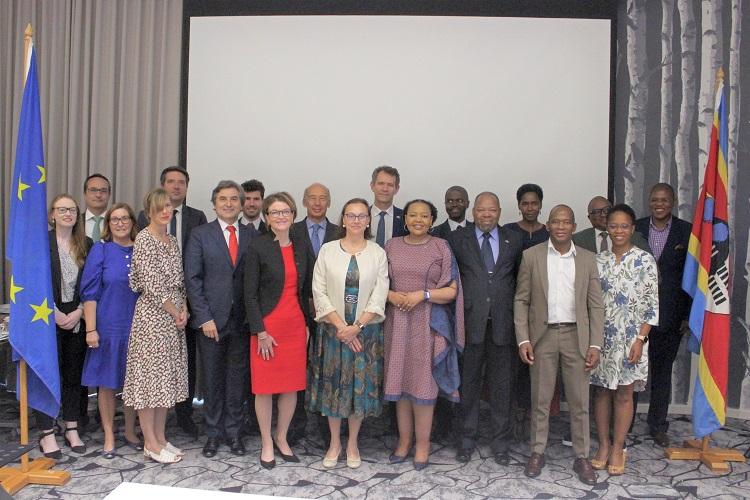Team Europe engages the Government of Eswatini in the annual Art.8 Political Dialogue

Team Europe consisted of the EU Ambassador to Eswatini, HE Dessislava Choumelova, the Ambassadors to Eswatini of Finland, HE Anna-Kaisa Heikkinen, Spain, HE Alberto Cerezo Sobrino, Italy, HE Gianni Bardini and Portugal, HE Antonio Costa Moura, the Belgian Charge d’affaires, Bart de Wolf, deputy heads of mission of France, Samuel Richard, and Sweden, Amanda Hogberg, as well as representatives of the missions of Germany, Axel Bayer, and Ireland, Niamh Casey, all accredited to Eswatini.
Leading Team Europe, the EU Ambassador to Eswatini, presided over the proceedings as the Lead Chair with the Eswatini acting Minister of Foreign Affairs and International Cooperation, Pholile Shakantu (who is Minister of Justice and Constitutional Affairs) as the co-Chair. The Eswatini delegation also comprised the acting Deputy Prime Minister, Neal Rijkenberg (who is Minister of Finance), the Minister of Economic Planning and Development, Dr Tambo Gina, the Attorney-General, Sifiso Khumalo, the Eswatini Ambassador to Belgium and the EU, Sibusisiwe Mngomezulu, as well as senior government officials.
The following is the Joint Communique issued at the end of the Dialogue:
21st POLITICAL DIALOGUE BETWEEN
THE EUROPEAN UNION AND THE GOVERNMENT OF THE KINGDOM OF ESWATINI
30 SEPTEMBER 2022
JOINT COMMUNIQUE
The Government of the Kingdom of Eswatini (KoE) and the European Union (EU) held on 30 September 2022 their 21st Political Dialogue, established on the basis of the article 8 of the Cotonou Agreement. The dialogue, held in Mbabane, covered areas including international affairs, political and legislative matters; freedom of expression and access to information; human rights matters; rule of law and judicial matters; trade and economic issues; investment, business environment and development cooperation matters as well as climate change commitments.
EU Ambassador to Eswatini, H.E. Dessislava Choumelova, chaired the meeting, while Eswatini’s acting Minister of Foreign Affairs and International Cooperation, Hon. Pholile Shakantu was the co-chair. The EU side comprised EU Member States Ambassadors accredited to the country from Pretoria and Maputo and senior diplomats. The Government side, on the other hand, included Cabinet Ministers and senior Government officials.
The parties reiterated their commitments to the shared values of their partnership based on democracy, rule of law and the respect for human rights as stipulated in art. 9 of the Cotonou Agreement. The EU pledged its continued support to development initiatives in Eswatini.
POLITICAL AND LEGISLATIVE MATTERS
The Kingdom of Eswatini provided updated information on the political situation in the country. The importance of an all-inclusive and timely national dialogue in Eswatini was also discussed.
The EU provided the Government with information on the consequences of the unprovoked Russian aggression war on Ukraine. The parties also discussed the situation of the ongoing insurgency in Cabo Delgado in Mozambique and Eswatini’s possible support to the region.
Furthermore, the KoE gave an update on family Bills meant to be aligned with not only the country’s Constitution but also with international instruments such as CEDAW (UN Convention on the Elimination of all Forms of Discrimination Against Women) thus strengthening the protection of women’s rights.
FREEDOM OF EXPRESSION AND ACCESS TO INFORMATION
The meeting also discussed issues of freedom of expression and access to information. To that end, the Government provided an update on the status of the Eswatini Broadcasting Corporation Bill of 2019 which aims to improve the country’s broadcasting sector. Issues of access to information were also discussed.
HUMAN RIGHTS
The KoE presented an overview of Eswatini’s submissions before the last Universal Periodic Review (UPR) process which took place in Geneva in November 2021. The EU took note on the progress made on some of the recommendations from the previous UPR including the amendment in 2017 of the Suppression of Terrorism Act of 2008, the passing of the Public Order Act of 2017 and the implementation of the Sexual Offences and Domestic Violence (SODV) Act of 2018.
Also discussed was progress made by the Government on the Human Rights Bill, which marks an evolution in the operationalisation of the Human Rights Commission as well as the merger of the Human Rights Commission and the Anti-Corruption Commission. The EU noted the progress made in that regard.
The non-discrimination of people on the basis of sexual orientation were also on the talks while noting that the registration of LGBTIQ+ association’s case was still pending before Courts.
As Eswatini has been voting for several years in favour of the United Nations General Assembly Resolution on the Moratorium of Executions, the EU once again encouraged the Government to consider formally abolishing the death penalty.
RULE OF LAW AND JUDICIAL MATTERS
The dialogue also focused on the rule of law, with the Government providing an update on the law reform process to align all laws with the country’s Constitution as well as efforts being made to strengthen the administration of justice in Eswatini.
Whilst commending the Government on the implementation of the Sexual Offences and Domestic Violence (SODV) Act, the EU also encouraged the KoE to step up efforts in the area of education and training of law enforcement agencies to curb the scourge of violence against women and children.
TRADE AND ECONOMIC MATTERS
The parties exchanged on Eswatini’s fiscal and economic outlook post COVID-19, the medium term economic recovery strategies as well as the country’s counteractive measures on the impact of the rising commodity prices and food security threats.
The discussions also covered the KoE’s progress on the implementation of the EU-SADC Economic Partnership Agreement (EPA) and the African Continental Free Trade Area (AfCFTA) including the e-commerce Platform.
INVESTMENT, BUSINESS ENVIRONMENT AND DEVELOPMENT COOPERATION MATTERS
The Government presented an update on the National Development Strategy (DNS) as well as the National Development Plan (NDP) which are both critical for Eswatini’s socio-economic development with the focus on improving the quality of life in the country including access to health, education, poverty reduction, employment creation, gender equity, social cohesion and protection as well as environmental protection. The meeting agreed that the test for the NDP’s strength will be its successful implementation for the benefit of the country’s citizens.
On other hand, the EU provided an update on its next budgetary cycle (2021 – 2027), the Multi-annual Indicative Program (MIP) for Eswatini which is under the new “Global Europe: Neighborhood, Development and International Cooperation Instrument”. Once implemented, the new MIP will concentrate on one priority area - Human Capital Development and Social Inclusion, embracing the standard of living and education dimensions of human development through a focus on two interlinked sectors: market-driven vocational education and training (TVET) and empowerment of disadvantaged youth and women in vulnerable situations.
Under these sectors, gender equality, girls’ and women empowerment will be a horizontal priority in line with the objectives of the EU’s Gender Action Plan (GAP) III.
The Government also presented its plans for improving the ease of doing business in the country. The EU welcomed these intentions. For the EU budgetary cycle 2021-2027, the parties have jointly identified potential sectors to receive EU support: green economy, development of human capital focused on youth and good governance with a focus on digitalisation. These sectors reflect both Eswatini and EU’s priorities and interests.
CLIMATE CHANGE, BIODIVERSITY AND ENERGY – ESWATINI COMMITMENTS
The EU encouraged Eswatini to stand by its climate commitments and steer towards renewable energy sources.
NEXT POLITICAL DIALOGUE
Given the 2023 national elections in Eswatini, the parties agreed that the next Political Dialogue will take place in the first half of 2023, possibly under the new framework of partnership.
Mbabane, 30 September 2022


